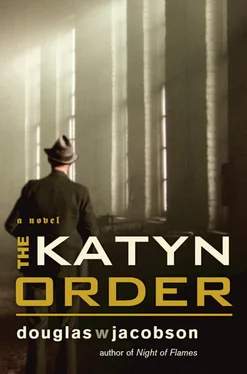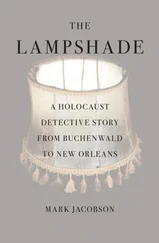Adam stared at her for a long moment knowing that he should leave right now. There was no point in doing anything else. He stood there for what seemed like a lifetime, then finally sat down next to her. The ground shuddered and the support post in the center of the room creaked. He thought about what she’d just said about her brother, and wondered if there was anything that any of them could do now that could possibly make a difference.
“It’s Adam,” he said quietly. “My name is Adam Nowak. And I know about the Katyn Forest and… I’m sorry.”
31 AUGUST
THE MEMORIES DRIFTED BACK. Adam could feel them pushing their way out of the darkness where he’d left them. He had managed to get through years of brutal warfare and to reconcile the killing, the assassinations, because he’d so successfully buried his past. Adam Nowak had ceased to exist, as much in his own consciousness as in the clandestine world of the dark and silent.
But now, as he sat on the cold, dirt floor of an empty ammunition cellar next to this annoying woman, who had somehow managed to bore into his soul, the memories returned… and he was powerless to stop them. There was something about Natalia that he couldn’t explain, something that he wasn’t sure he’d ever be able to explain.
He said quietly, “You asked me why I came back to Poland.”
She nodded.
He pressed his fingers to his temples, a part of him still wondering what he was doing here. They hardly knew each other, and yet…
When he spoke again he barely recognized his own voice. It was as if someone else were telling the story. “My father died while I was in the American Army. I never really knew him when I was a boy living in Krakow. He was away, fighting with the Polish Legions in the Great War. My mother died when I was a baby, and I was raised by my uncle and aunt.”
Adam paused, listening to the pulsating throbs of artillery shells. “My father worked hard during our years in America and managed to send me to college. I knew he wasn’t happy when I dropped out of law school and joined the army, but he never said anything, and when he died… I don’t know… everything changed for me. I loved America. I loved being an American soldier, but that was 1936 and there was no future in the army. I served out my three-year enlistment, but something was missing.”
Natalia touched his knee. “You came back to the uncle and aunt who’d raised you when you were a little boy?”
Adam nodded and swallowed hard, thinking of his uncle—the larger-than-life presence who had always seemed to be there when he needed him, the steadfast Polish patriot who helped shape the country’s hard-won freedom yet took time to tutor his young nephew in philosophy, history and literature. “His name was Ludwik Banach,” Adam said. “He was a law professor at Jagiellonian University, and when I returned to Krakow he arranged for me to resume my studies in law school. I lived with them for three years. It was the closest thing I ever had to a family.”
Adam stood up and paced slowly around the cellar room. Shadows danced off the rough stone walls. The constant thump of artillery and cracks of rifle fire echoed through the subterranean chamber.
“What happened to them?” Natalia asked.
“My uncle was arrested by the Nazis in November of ’39 and sent to a prison camp in Germany—a place called Sachsenhausen. They sent hundreds of professors and teachers there. My aunt was arrested the next day. I’m sure they’re both dead by now.”
Adam closed his eyes and thumped his fist against the post, rattling the lantern. He recalled every detail of the moment when the German SS officer told him about his uncle’s arrest: the moment he became consumed with rage, consumed with his quest for revenge. He hadn’t talked about this with anyone—not since Whitehall sent him to see that psychologist before recruiting him, a sniveling little weasel who declared that he was too angry to be of any value. It was apparently just what Whitehall needed to hear.
“I wanted to kill someone,” Adam said, “or have them kill me; it didn’t matter.”
He looked at Natalia. There was an expression on her face that said she understood.
“It’s ironic,” he said. “My uncle was like you. He always feared the Russians more than the Germans. He was an internationally known legal scholar who traveled all over Europe, especially to Germany. And right up until the day the Wehrmacht marched into Krakow, he was convinced that Hitler was bluffing. ‘It’s the Russians we have to fear,’ he always said.”
“I think he got it right,” Natalia said sharply, “despite what happened to him.” She got to her feet and stepped up to him. “The Russians could stop this, Adam. They could have stopped it a month ago. But they’re not going to. They’re going to sit on the other side of the river like vultures and let the Nazis destroy us. Then they’ll destroy the Nazis. The Russians will sweep through Poland, seal off the borders and hunt down every last one of us in the AK. Then they’ll turn everyone that’s left into good little communists.”
Natalia kicked a stone across the room. Adam watched her, fascinated by her passion. She cocked her head and looked at him. “So, how was it that you got away from the Germans when your uncle and aunt were arrested? You were related to them, after all.”
Adam shrugged. “The SS kept me in jail for a few days, threatened me, beat me up a bit… but even though I was born in Poland, I was an American, a civilian with a valid U.S. passport, and we weren’t at war yet. So, I was deported.”
“Back to America?”
“That was their intention. I was put on a train with a dozen other Americans who were all being deported back to the states, some of the last ones left in Krakow at the time. But the Germans turned us over to the Belgians when we got to the border. We got off the train in Antwerp, and the rest of them boarded a bus for the port to catch a ship back to America.”
“But you stayed behind.”
“The day before my uncle was arrested he gave me a name and a telephone number—in case anything happened. The name was Stanley Whitehall and the telephone number was the SOE in London.”
“Your uncle was connected with SOE? Sounds like he was more than just a college professor.”
Adam nodded. “I suspected it back in ’39 when the war broke out. But after he was arrested… I don’t know. I didn’t think about it… I just wanted… revenge.”
The shelling was closer now. The walls shook, and pieces of brick fell from the crumbling ceiling. At least the dampness was gone, driven away by the heat of fires that were raging in the streets above them. As they huddled together in a corner of the cellar, Natalia wondered if they’d ever get out of there. And if we do, then what? It had been so long since she’d had any kind of normal life she couldn’t even imagine it.
Suddenly a very loud, very close artillery blast shook the walls of the cave-like cellar. Natalia flinched as the vibration through the earthen floor ran up her spine. The lantern swung back and forth precariously on the post, and Adam slid his arm around her, pulling her closer. “Tell me about your village,” he said.
“My village?”
“Yes, where you grew up. Tell me about it.”
She pulled away. “Why?”
“Because I’d like to know. Besides, like you said the last time we were here, it’s better than just listening to the shelling.” There was a softer expression on his face, something she hadn’t seen before. He seemed… more relaxed.
She leaned back against the wall and sighed. It was so long ago. “I grew up ten kilometers east of Lwow, a rural area, mostly peasant farmers who’d been there for generations. My father was a doctor, and there was a small hospital. I worked there when I wasn’t at university in Lwow.”
Читать дальше












